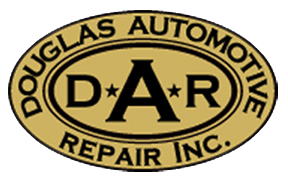1. Stay calm. Try not to panic. Be courteous.
2. Check yourself and others involved to see if there are injuries. In some states, failing to render medical aid is a crime.
3. Call an ambulance (911) if there are injuries that may need treatment.
4. Turn your hazard lights on.
5. If you keep flares and warning triangles in your vehicle, use them to alert other drivers in the area. Douglas Automotive Repair, Inc. recommends that all drivers keep safety devices stored in their vehicle along with a first aid kit.
6. If the accident is not serious, and the car(s) involved are in the street, move them off the road if possible. But make sure you don’t move them so far that you could be accused of leaving the scene of the accident.
7. Call the local police department regardless of the seriousness of the collision. If there is no documentation of the accident, you can’t file a claim.
8. Don’t admit fault.
9. Write down critical details about how the collision occurred while it is fresh in your memory. If you have a mobile app for your auto insurance, it probably provides an easy way to enter this information.
10. Exchange contact and insurance information with the other driver(s) involved.
11. If there are witnesses, get complete contact information.
12. Take photos of the accident with your phone or other mobile device.
13. If the other driver is not the person listed on the registration, find out how they are related.
14. When police officers arrive, record their names and badge numbers.
15. Don’t tell the other driver(s) anything about your auto insurance coverage limits.
16. Make sure you understand clearly what happened. (See number 9.) Be consistent when explaining the situation to police officers or your insurance agent. Don’t change your story or you will lose credibility. Don’t give details to anyone unless you are required to.
17. Make sure you take down the license plate numbers of the other vehicle(s) involved.
18. Consider hiring a lawyer if you have serious injuries that may require long term care or the other driver threatens or initiates legal action.
19. File your insurance claim as soon as you can. The claim process can take a lot of time. You don’t want to delay settlement unnecessarily. Save all receipts for any medical treatment or work done on your vehicle.
20. If your car isn’t drivable, find out if your insurance policy covers roadside assistance.
21. (This is a bonus!) Make sure you don’t put your signature on any report except those required by a law officer or insurance representative.
You will probably be involved in at least one accident during your lifetime, even if you are a very careful driver. The good news is that cars are safer than ever before and the rate of fatal collisions has dropped.
If you need accident repair for your vehicle, bring it to a reputable shop. Although we don’t do collision/body work, Douglas Automotive Repair can help with repairs to any undercarriage/mechanical damage to your vehicle. If your insurance agent tells you that you have to use a certain shop, check the laws in your state. Many states prohibit insurance companies from requiring you to use their contracted facility.
We wish you safe driving!
This entry was posted in Safety and tagged car accident, Safety on .

